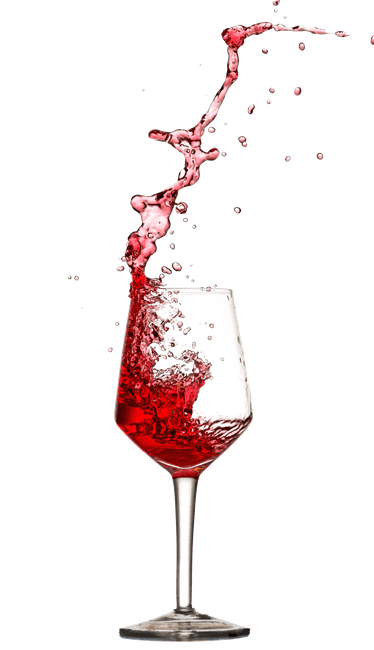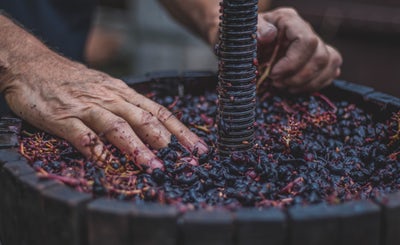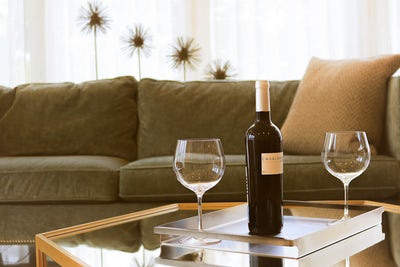Here are just a few health effects associated with daily moderately heavy alcohol consumption.
 Researchers have found that drinking red wine even moderately may actually increase the risk of heart disease by increasing the concentration of the amino acid homocysteine. And this corresponds with a huge increase in cardiovascular risk compared with those who abstain. Alcohol affects the stomach’s ability to bind Vitamin B12 with the hormone called intrinsic factor. This important vitamin can then not be effectively transported to the small intestine for absorption. Many guys I talk with who drink regularly have Vitamin B12 problems, and this is revealed with a blood test. The lower the B12, the higher the risk for heart disease. You see, alcohol really is a dual edged sword and I’ve only just scraped the surface with vitamin and mineral deficiencies here.
Researchers have found that drinking red wine even moderately may actually increase the risk of heart disease by increasing the concentration of the amino acid homocysteine. And this corresponds with a huge increase in cardiovascular risk compared with those who abstain. Alcohol affects the stomach’s ability to bind Vitamin B12 with the hormone called intrinsic factor. This important vitamin can then not be effectively transported to the small intestine for absorption. Many guys I talk with who drink regularly have Vitamin B12 problems, and this is revealed with a blood test. The lower the B12, the higher the risk for heart disease. You see, alcohol really is a dual edged sword and I’ve only just scraped the surface with vitamin and mineral deficiencies here.
- A study has shown that consuming just one drink per day may increase the risk of breast cancer in women. Alcohol reduces the liver’s ability to clear oestrogen, as well as increasing the body’s oestrogen levels generally, which may promote breast cancer. Now tell me, how many ladies stop at one glass per day?
- Other potential risks with very regular wine consumption: pharmaceutical drug interactions (many), increased incidence of accidents, several liver diseases, high blood pressure and stroke, digestive problems, as well as impaired fertility in men and women.
- Your poor brain, remember after you turned 40, how you felt that morning after only a few reds?
- Alcohol in large and regular amounts affects your ability to handle stress, which in turn increases your desire for more alcohol. People who abuse alcohol have all kinds of health-related problems as well as a lot more accidents. An impaired stress response affects several body systems, including the ability of the immune system to fight infection and even of brain cells to learn and remember, according to the researchers. Studies show that alcohol causes the body to lose part of its ability to respond to additional stressors. Heavy drinkers may therefore become unable to activate their stress axis appropriately when they are faced with a challenge, and that can be damaging.
- Wine makes you fat, each gram contains 7 calories. (fat contains 9 calories per gram). Guys end up with the belly, and women may end up in the BBC. (the big bum club!)
Here are three real case histories which illustrate what I mean about red wine, the cases are all real but the names have been changed:
Jeff
Jeff is a 33yr old guy who works as a plumber and also moonlights part-time as a web design student. Jeff came into my clinic complaining of poor sleep and libido and chronic fatigue. When I queried his lifestyle it was obvious that wine was consumed most evenings, “I have three to four glasses of wine because it relaxes me and makes me feel good”, “I make my own wine but end up giving a lot away to my mates”. Jeff also has a less than healthy diet and goes to bed quite regularly around 12.00 pm – 1.00am. Jeff has had a few accidents the past few years, including a nasty fall from the roof of his house trying to fix spouting. He admitted to me that he started the work “after a few wines” one Saturday afternoon, and he is still visiting a chiropractor three years later. His doctor did all the obligatory blood tests, blood pressure, etc, to establish the cause of his tiredness. And of course everything came back 100% fine. The doctor never enquired into his occupation, his diet or any aspects of his lifestyle.
What I always find interesting is that when a patient presents to a doctor of Western medicine with fatigue, their diet and lifestyle is rarely addressed, and this is exactly where the problem lies most of the time. Jeff needed somebody to sit down with him and examine where his tiredness was coming from, and to explain the likely causes. I finally convinced Jeff to stop drinking altogether for 3 months, to get to bed by 9.30 – 10.00pm at the latest and to get up early to establish a good rhythm of high energy in the morning and low energy in the evening. I also mentioned to Jeff that he probably wouldn’t have had that fall if he tackled that spouting job sober. Jeff is now very happy, he has made major changes and realised that he had his lifestyle back to front. Jeff now functions much better as a father and husband and hardly ever drinks at all.
Graeme
 Graeme is a 57yr old lawyer who came in on recommendation of his wife. When Graeme gets home from the office during the week, he has a large glass of red wine, followed by a second glass before dinner with some crackers and cheese, and a further glass is served with the evening meal. Graeme frequently goes to wine tastings and enjoys a glass at the golf club after a game. During the weekends there often friends and family often come visiting and wine is never far away, after all, they had a cellar built when the house was made and wine is bought by the carton through the wine club. Graeme is about 20 kilograms overweight, does not exercise and has been under considerable stress after one of the senior partners from the law firm moved away some time ago.
Graeme is a 57yr old lawyer who came in on recommendation of his wife. When Graeme gets home from the office during the week, he has a large glass of red wine, followed by a second glass before dinner with some crackers and cheese, and a further glass is served with the evening meal. Graeme frequently goes to wine tastings and enjoys a glass at the golf club after a game. During the weekends there often friends and family often come visiting and wine is never far away, after all, they had a cellar built when the house was made and wine is bought by the carton through the wine club. Graeme is about 20 kilograms overweight, does not exercise and has been under considerable stress after one of the senior partners from the law firm moved away some time ago.
You can see where this is heading, Graeme’s cardiovascular blood tests revealed a high heart health risk due to elevated homocysteine levels. Graeme explained that his doctor was fine with his “moderate” red wine consumption because his cholesterol was fine, but I disapproved. I found out that Graeme’s doctor is a member of the same golf club and wine tasting group as Graeme. In addition, Graeme has a history of gout and high-blood pressure, and was keen to start working on a wellness plan because of his family’s history of heart-disease. He was rather surprised when I mentioned that regular and daily consumption of red wine wouldn’t be helping his health, and he promised to cut back considerably.
Peter
Pete is a pilot who still flies his small airplane at the age of 74. He has been flying for almost 50 years and wouldn’t trade it for the world. He takes exceptionally good care of his health including a regular 1 hour exercise program 7 days a week because he wants to be still flying at 90. Peter’s daughter is a physical education teacher who has taught him how to stay fit and flexible. I find it rare to see an elderly gentleman is such fine shape is truely amazing and inspiring, and Pete’s radiant smile is a testimony to his health. He enjoys one small glass of red wine each day with the evening meal for medicinal purposes of course, as he declares. His sleep is great and his libido is excellent beyond 70yrs of age. Peter’s diet is on par with the best I’ve seen and his blood pressure is 120/75, which is exceptional for his age. This is how red wine adds value to a person’s health, in small and regular amounts taken long term. Peter has been drinking red wine like this since the 1970’s.
Red Wine is the Only Alcoholic Beverage which Confers Some Limited Benefit, No Other Alcohol
Sorry chardonnay fans, but in terms of health benefits, white wines pale in comparison to reds. This is because white wines are traditionally made without grape skins, or the mashed mixture containing the skins is removed early in the fermentation process, which is where most of the protective compounds are found. When choosing a red wine, look for full-bodied wines which are rich in beneficial chemicals. A good quality Shiraz, cabernet sauvignon, merlot and even a blended Grenache all fit the bill. And remember, we are only talking about red wine here, not beer, spirits and all those “mixers” our younger people are into. Much of the benefit appears to be due to the polyphenols, an antioxidant, found in grape skins and red wine. Polyphenols are known to combat damaging free radicals in the body. It appears that polyphenols lower “bad” LDL cholesterol while raising “good” HDL cholesterol and decrease the production of a protein that plays a major role in the development of heart disease.
But before you go out and stock your pantry with red wine there are some precautions that need to be taken. While drinking about one glass of red wine each day may yield some benefit, drinking two or more glasses (of wine or any alcoholic beverage) may offset the benefit and increase your risk of many different types of health problems as previously, even cancers. So it is likely that the alcohol itself is irrelevant to the beneficial effects of wine consumption. In fact, alcohol actually is toxic and nearly all of the benefit attributed to drinking wine may be related to these polyphenolic bioflavanoid compounds.
And people with a history of alcohol abuse or any type of liver disease should not drink alcohol at all. Also, people with diabetes and hypertension should limit their intake of alcohol very much.
 You also need to be aware that consuming large amounts of wine or grapes will increase insulin levels and eventually have a negative impact on your health – you may pile on the weight. If you really want the flavonoid benefits of the grape, why then not consume whole a small amount of grape skins (spit out the seeds) and pass up most of the meat of the ripe grape, which has no real major benefit but a lot of extra fructose (sugar). A small bunch of ripe grapes daily is a great addition to any diet, and so is red grape juice. Now we are talking, all the benefits of the polyphenols but without the damaging effects of alcohol. There is no doubt, alcohol does have the ability to extract a lot more goodness from the red grape skin than can be offered from grape juice, but the downside is the damaging effects of the ethanol (alcohol) to the gut, brain and health in general as already mentioned.
You also need to be aware that consuming large amounts of wine or grapes will increase insulin levels and eventually have a negative impact on your health – you may pile on the weight. If you really want the flavonoid benefits of the grape, why then not consume whole a small amount of grape skins (spit out the seeds) and pass up most of the meat of the ripe grape, which has no real major benefit but a lot of extra fructose (sugar). A small bunch of ripe grapes daily is a great addition to any diet, and so is red grape juice. Now we are talking, all the benefits of the polyphenols but without the damaging effects of alcohol. There is no doubt, alcohol does have the ability to extract a lot more goodness from the red grape skin than can be offered from grape juice, but the downside is the damaging effects of the ethanol (alcohol) to the gut, brain and health in general as already mentioned.
One Small Glass a Day of Red is the Key
If you are going to drink, it does make sense to choose red wine over other alcoholic beverages, and use a wine saver to ensure the wine doesn’t oxidise and go rancid. You can even buy “wine saver” gadgets allowing you to pump out the air inside the bottle prior to sealing, making the remaining wine very durable. But wait for it, the liver suffers from alcohol! Even marginal drinking has an effect of undermining the liver’s ability to clear toxins from the body. Remember Peter the pilot? In Peter’s case, there are no fatty foods consumed, no chocolate or dairy products, take aways, etc. The only food or beverage Peter consumes which could potentially affect his liver is the tiny amount of red wine he consumes each evening, so no problems here. Once a person consumes several glasses of alcohol daily and in addition takes paracetamol or other medications regularly, consumes a take-away once or twice a week, eats high fat foods like peanuts or regular chocolate bars, consumes sugary foods, etc, is when you start to load the liver’s capacity to detoxify. It’s all about the concept of “total load”.
Can We Test the Liver’s Function?
Standard LFT’s (liver function tests) studies done by your doctor are effective for detecting actual damage to your liver. These blood tests are of limited value however in detecting your liver’s actual detoxification potential, because they measure acute liver cell damage directly, rather than functional capability of your liver, i.e., the uptake, metabolism, storage, and excretion of toxic substances like alcohol, drugs, chemical sprays, solvents, etc.

Why wait until damage is done? Besides the standard liver function test, there is a simple urine test available which can identify how your liver, the body’s main detoxifying organ, is handling a wide variety of chemicals, including wine. Your naturopath can fill you in more.
All of the research I have studied appears to back up what we have always known, than light to moderate reed wine consumption is ok for your health. But that is exactly the point, light to moderate consumption. When it comes to alcohol, like anything else in your life, moderation is your key.
By Eric Bakker ND
Read more from Eric on red wine here.
References
- JAMA September 2001 (286:1177-1178)
- Medical Journal Arteriosclerosis, Thrombosis and Vascular Biology. (December 2003)
- Landolt, H.-P., et al. Late-afternoon ethanol intake affects nocturnal sleep and the sleep EEG in middle-aged men. J Clin Psychopharmacol 16(6):428-436, 1996.
- Vitiello, M.V. Sleep, alcohol and alcohol abuse. Addict Biol (2):151-158, 1997.
- Aldrich, M.S. Effects of alcohol on sleep. In: Lisansky Gomberg, E.S., et al., eds. Alcohol Problems and Aging. NIAAA Research Monograph No. 33. NIH Pub. No. 98-4163. Bethesda, MD: NIAAA.
- Alcoholism: Clinical & Experimental Research 2000;24:110-122.










Join the Discussion
Type out your comment here:
You must be logged in to post a comment.